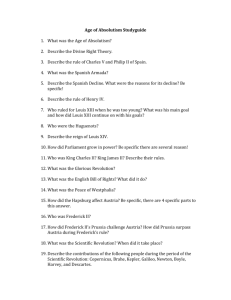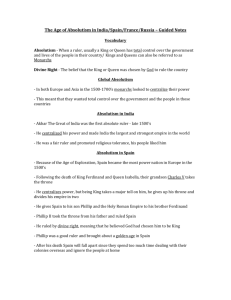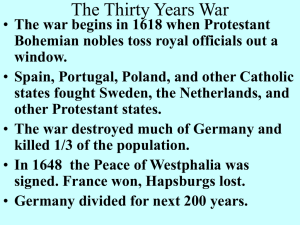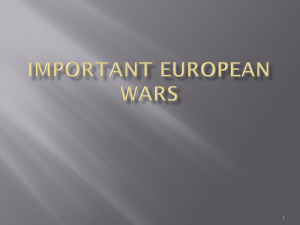File
advertisement
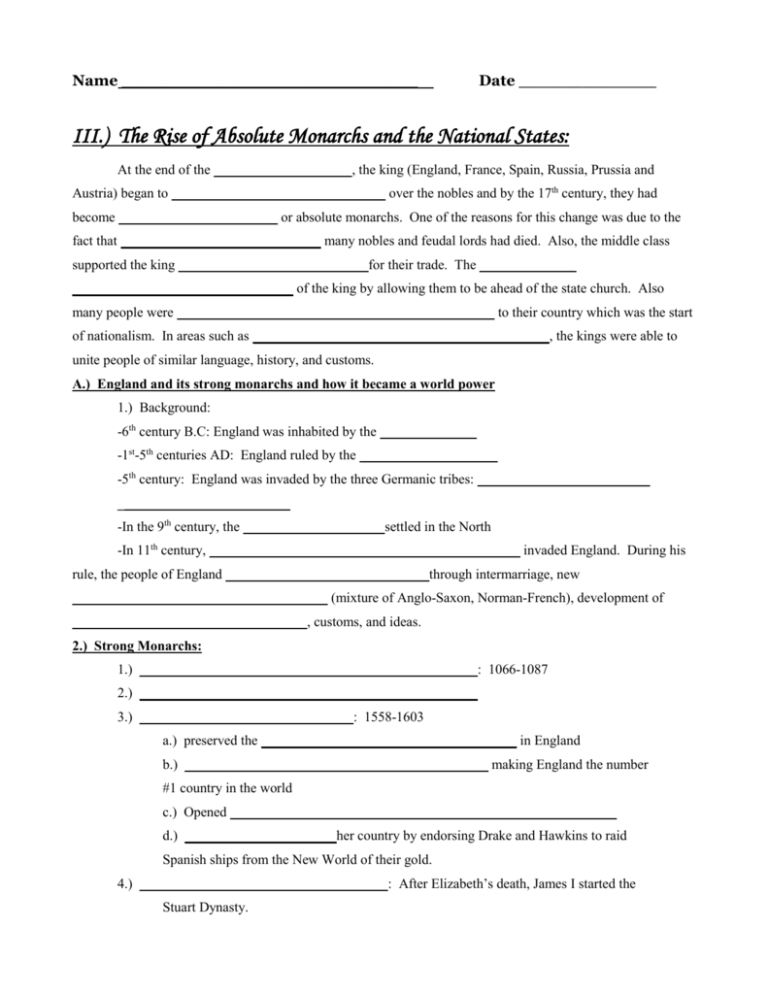
Name ____________________________ Date _____________ III.) The Rise of Absolute Monarchs and the National States: At the end of the ____________________, the king (England, France, Spain, Russia, Prussia and Austria) began to _______________________________ over the nobles and by the 17th century, they had become _______________________ or absolute monarchs. One of the reasons for this change was due to the fact that _____________________________ many nobles and feudal lords had died. Also, the middle class supported the king ___________________________ for their trade. The ______________ ________________________________ of the king by allowing them to be ahead of the state church. Also many people were ______________________________________________ to their country which was the start of nationalism. In areas such as ___________________________________________, the kings were able to unite people of similar language, history, and customs. A.) England and its strong monarchs and how it became a world power 1.) Background: -6th century B.C: England was inhabited by the ______________ -1st-5th centuries AD: England ruled by the ____________________ -5th century: England was invaded by the three Germanic tribes: _________________________ _________________________ -In the 9th century, the ____________________ settled in the North -In 11th century, _____________________________________________ invaded England. During his rule, the people of England _____________________________ through intermarriage, new _____________________________________ (mixture of Anglo-Saxon, Norman-French), development of __________________________________, customs, and ideas. 2.) Strong Monarchs: 1.) _________________________________________________: 1066-1087 2.) _________________________________________________ 3.) _______________________________: 1558-1603 a.) preserved the _____________________________________ in England b.) ____________________________________________ making England the number #1 country in the world c.) Opened ________________________________________________________ d.) ______________________her country by endorsing Drake and Hawkins to raid Spanish ships from the New World of their gold. 4.) ____________________________________: After Elizabeth’s death, James I started the Stuart Dynasty. B.) France: Absolutism and world power 1.) Background: -7th century B.C. France was inhabited by the _______________ -58 -50 B.C. __________________________________________ and ruled by Romans until 5th century AD -5th century, the Germanic tribes, ________________________ and ______________ settled France -9th -10th century, _________________________ (Vikings) settled Normandy -8th-10th century, France was ruled by _____________________________________________ and their descendants 2.) Road to Absolutism: a.) __________________: 1461-1483: very successful monarch, curbed feudal anarchy, set up ___________________________________________. He is known as the ____________________________________________________________ monarchy. b.) ______________________________________: 1624-1642: a cardinal from the church and a minister to King Louis XIII. He directed French affairs to ___________ _______________________ for the king and moved France to becoming a world power. c.) _______________________: 1643-1715: Known as the ______________________ or the _______________________________: Represented the ____________________ __________________________. He believed in the divine rights of Kings. He _ ___________________________________ to he built a beautiful palace 12 miles outside the city known as the palace of Versailles. At the palace, he entertained the nobles and they loved him. Louis practiced unlimited political powers and not once did he speak to the Estates-General. His favorite saying was “L’etat, c’est moi” which means “__________________________________________.” Economically: France prospered through ___________________________________________, built roads, and canals and new industries were built and new trading posts were open in India and North America. Religious: Removed the ____________________________________ and caused thousands of Protestant workers to leave France. After Louis XIV’s death, France was the leading nation on the European continent. However, _______________________ did not have the success of the Sun King and his reign led to the French Revolution. C.) Spain: Absolutism and World Power but then decline: 1.) Early History: -3rd century B.C., Spain was colonized by ____________________________________________, and Carthaginians -201 B.C. Spain became part of ____________ after the Punic War -For the next 600 years, Spain was ruled by the ______________________ -In the 5th century AD, Spain was settled by __________________________________________. -In 8th century, Spain was invaded by ___________________________________________ known as _________________. 2.) Unification of Spain: -11th to 15th century: The ______________________________________________ began to have wars with the Moslems and slowly they began to __________________________________________. In 1469, ___________________________________________________________________ and therefore, the Christian Spanish kingdom was united. By way 1492, their united armies finally conquered Granada which was the last stronghold thus ending the rule in Spain. -Ferdinand and Isabella increased the _______________________________ in Spain. They weakened the ______________________________________, gained power in the Catholic Church by nominating important church officials to office. -Ferdinand and Isabella promoted ___________________________ in Spain by pushing Catholicism and persecuting Jews and Moslems and eventually expelling them. -Ferdinand and Isabella pushed Spain to be a ______________________________ by financing Columbus’ trip to the New World. Spain was able to _________________________________ in the New World and began to collect new found wealth in gold and silver from the new world. 3.) __________________________ (1519-1556): He was the ___________________________ of Ferdinand and Isabella. He began the absolute monarch in Spain. He controlled not only Spain but its ___________________________, including Netherlands, Sicily, and southern Italy. In 1520, he became the _______________________________________. His son was Phillip II. 4.) ____________________________: 1556-1598: Phillip II ___________________________ ________________ to attack England and he lost. He could not stop the English under the direction of Elizabeth from stopping his ships from the new world and __________________________________ they were carrying back. He produced an ________________________________________ and the people were not happy about the tax burden and the bad economy. His reign started Spain on a decline in the world power. D.) Russia: Absolutism and Expansion: 1.) Early History: -8th century AD: Russia was inhabited by _____________________________ -9th Century, Russia was settled by _______________________________ -10th Century, Russia was influenced by the ___________________________________ and the Eastern Orthodox Christianity also moved into the area. -13th century, Russia was conquered by ________________________________ and for the next _____________________, Russia was controlled by the Mongols who ____________________ ways of living. 2.) ________________________________: 1462-1505: He ended the ____________________ and _____________________________________________. 3.) __________________________________________: 1533-1584: He was ______________ but he was the first ruler to assume the _____________________ of Russia. 4.) ___________________________________: 1613: He took over the ruling of Russia and for the ________________________________, the __________________________ ruled Russia until the ____________________________________ in 1917. 5.) __________________________________: 1682-1725: _____________________________ ___________________. He ___________________________________________ in Russia by creating a strong army that was loyal to him. He __________________________________ who were fighting against him. He extended government control over the Russian Orthodox Church. Peter wanted to model Russia after ____________________________________ rather than __________________________________ culture. He had traveled to Western Europe and he greatly admired its civilization. He brought ____________________________ ideas of Science, education, military training and industry to Russia. He had the men of Russia to ___________________________ and discard their Oriental garments. Peter’s goal was to _______________________________ country with water routes for trade. He won control of the Baltic Sea and he built his capital, St. Petersburg on the sea port. 6.) ______________________________________________: 1762-1796: German wife of the Russia Czar. She deposed her husband and ruled Russia as an autocrat. She was successful in _______ ________________________ both in the south and the west. Catherine gained the northern coast of the Black Sea and the right for Russian ships to sail from the _________________ into the Mediterranean. Catherine building on Peter’s accomplishments and ruled an empire made up of Slavic people, Russians, Ukrainians and Pole as well as Baltic and Asian. She made 18th century Russia into a _____________________________. E.) Prussia: Absolutism and Territorial Expansion: 1.) Early History of the Hohenzollern Rule: -Ruled by the ________________________________________ from Germany who acquired Prussia from the Germans -The Hohenzollern family established ________________________________________ and created a well-trained army. -They expanded their empire through __________________________________ and diplomacy. -The Hohenzollern family ruled Prussia for the next ________________. In 1871 when Prussia unified the German states, the Hohenzollern king of Prussia became the emperor of Germany. 2.) __________________________________: 1740-1786: He is the ____________________ of the absolute monarchs and he was a military genius who had an aggressive foreign policy. He attacked Austria and seized part of its territory. He started a war known as the Seven Years’ War against Austria, Russia and France. He won with only the help of England. F.) Austria: Absolutism and their empire: 1.) Hapsburgs Acquire Austria: -The ___________________________________ started as feudal lords who owned minor territories such as Alsace, Switzerland and southern Germany. In 1273, __________________ of Hapsburg Family was known as the Holy Roman Emperor and he then became the ruler of Austria. He laid the ________________________ for future Hapsburg power. For the _____________________, his family governed over Austria and they also were the head of the Holy Roman Empire until its end in 1806. 2.) Hapsburg success: -The Hapsburg family great ________________________________. They achieved this land increase through political marriages, territorial inheritance and alliances. By the 18th century, the Hapsburg rulers __________________________________________ living in Austria, Austrians, Germans, Hungarians, Belgians, Czechs, Poles, Rumanians, Serbs, Slovenes, and Italians. 3.) Leading Hapsburg Rulers: a.) ________________________________: ruled from 1740-1780: She was the _______________________________________. In his will, he left his empire of Austria to his only daughter, Maria Theresa. Charles VI feared that Maria Theresa and Austria would be attacked after Charles’ death so he got the powers of Europe to sign the _________________________________, which the European leaders agreed to allow her to rule without being attacked. _____________________ signed the paper along with the rest of Europe and yet he broke the agreement and took over Silesia. Maria Theresa continued to rule and she was an _________________________________ and she promoted prosperity. b.) _________________________: Ruled 1780-1790: He was the eldest son of Maria Theresa. Joseph II was able to _________________________________________. He seized the Catholic Church’s land and subjected the church to be under the state control. He weakened the nobles by __________________________ and canceling many of their serf obligations. He abolished local selfgovernments. He expanded educational facilities, and attempted to make all persons equal before the law. Wrap up of Absolute Monarchies: 1.) Achievements: -weakened the forces tending to disunite a country -provided a __________________________________________________ -generally furthered the growth of national states 2.) Weaknesses: -made a nation’s _______________________________________ on the ability of one person -often sacrificed the national well-being for the autocrat’s personal wishes or family interest -led their nations into countless costly wars -disregarded the needs and rights of the common people 3.) Absolutism attacked by intellectuals: -18th century philosophers believed that the absolute monarchies stemmed from a tradition of ___________________________________ that violated all reason -they were against ________________________________________, legal and social inequalities such as serfdom, ignorance and religious intolerance. -They believed _________________________________________________________________. 4.) _________________________________________: These are absolute rulers who believe that they were ruling in the ___________________________________________. Many introduced reforms during their rules. a.) ______________________________________: supported literature, music and science. He promoted education and introduced new agricultural methods. He also supported equal legal treatments for all persons. b.) _________________________________________: She supported the arts, literature, and science. She allowed self-government in local areas. She also encouraged legal reforms. c.) _________________________________________: see above 5.) Failure of Enlightened Despotism: a.) people ________________________________ with the class distinctions, the unfair taxation and frequent wars. b.) could not assure good government by their _________________________________ *Many people _____________________________________ against royal absolutism.



